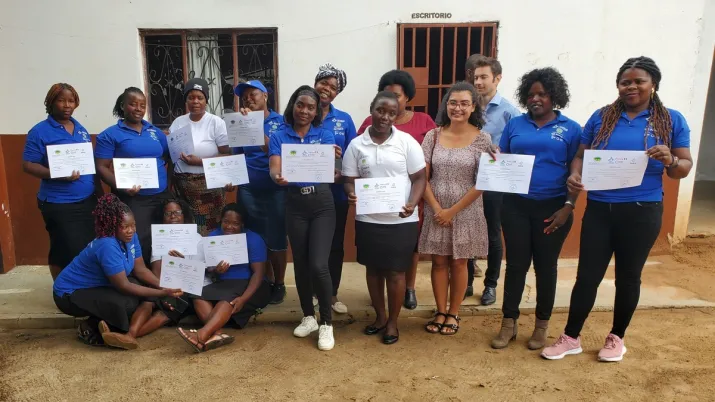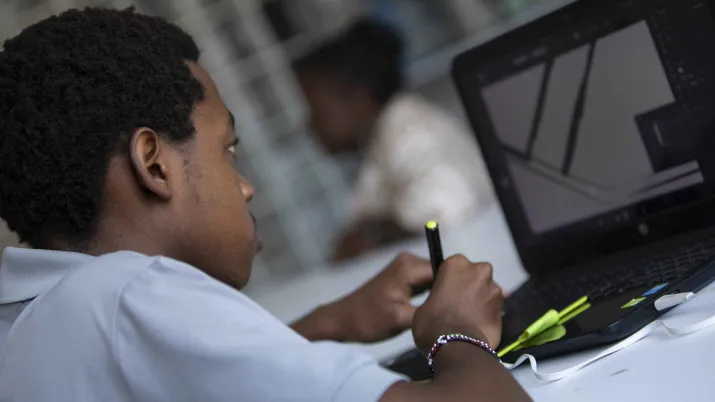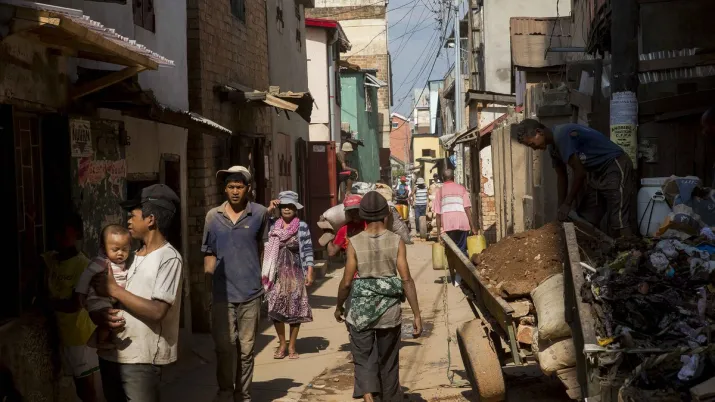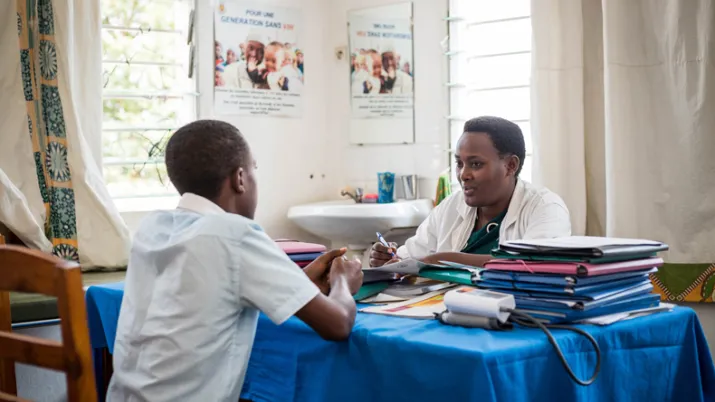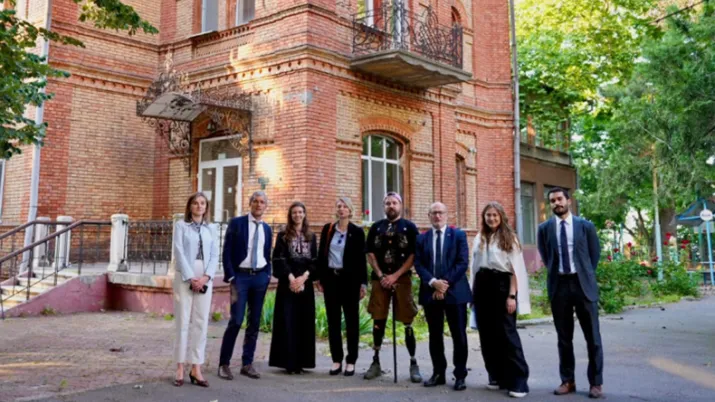Share the page
Health and Social Protection
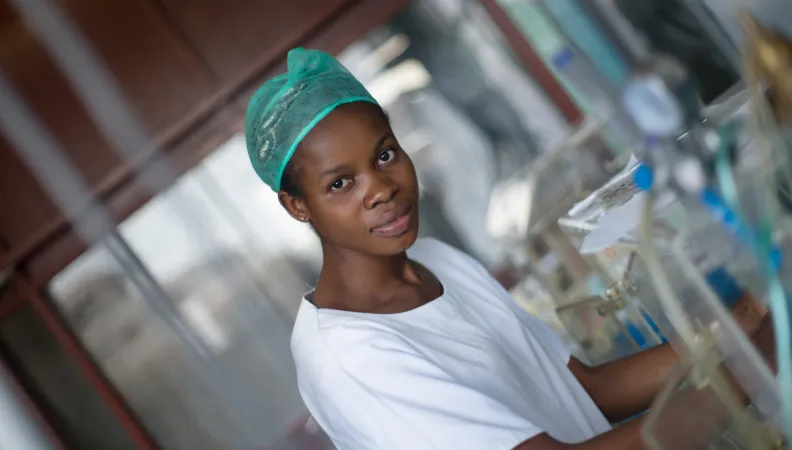
Our commitment
Access to good-quality health care and social protection for all, the reduction of infant and maternal mortality, resilience to climate change, these are all major challenges of the 21st century. At the crossroads of global demographic, economic and environmental challenges, health and social protection have become a central focus of AFD’s action around the world.
Our approach
In the last 15 years or so, historic progress has been made: reduction of child mortality as well as improvement in maternal health and in the fight against HIV/AIDS and malaria, etc. But with 8.5 million people on the planet in 2030, health is one of the major challenges for the coming years. How can each person be guaranteed quality care? How can maternal mortality be reduced? How can avoidable deaths of newborns be eliminated? Avoid income loss in the event of climate shock?
AFD’s Health and Social Protection Strategy is perfectly consistent with the SDGs. In it, health development is considered in close relation with demographic, economic and environmental challenges.
More broadly, health challenges are incorporated into AFD’s policy of carrying out projects that are 100% climate-compatible. For instance, epidemiological surveillance and nutrition are repositioned into States’ policies for adaptation to the effects of climate change. More generally, we consider health – including financial accessibility to care – as a factor of resilience, especially for the most vulnerable populations.
AFD supports the sector through grants, long-term loans, guarantees and capital investments. It also manages grants that stem from European funds. These may round out a loan to finance our technical support program, for example.
AFD and health: guaranteeing access to quality health services for all
By 2030, the world will have 8.5 billion inhabitants. Establishing universal health coverage (UHC) is essential in ensuring quality of life for all. This concept supported by France establishes that “all citizens should receive the quality services they need, without encountering financial difficulties”. UHC is now one of the most powerful drivers of social equality, especially within the framework of the Sustainable Development Goals (SDG).
To achieve this objective, AFD is taking action to guarantee good-quality health care and ensure that each individual has access to this care.
We work together with our partners to reinforce all the components of health care systems (infrastructures, human resources, equipment, medicine, governance) in order to respond to all the current and future health needs of populations. We also support the establishment of solidarity funding measures for health care to ensure fairness and financial protection in access to health care.
Our objective is to work with our partners to build stable and sustainable societies that leave no one out.
In 2017, 214 million women were deprived of access to contraception. West Africa is the region of the world where teenage pregnancy is most frequent. Lack of access to contraception is a major obstacle to the empowerment of young girls as well as to their access to education, employment and income. Sexual and reproductive rights are the foremost conditions for equality between women and men.
AFD’s action seeks to guarantee these rights and to ensure access by women and girls to services of suitable quality. Our objective is to prevent women from dying during childbirth, allow them to choose the number of children they will have, have access to education and work, and contribute to their country’s development and social progress.
In the countries that have not yet started their demographic transition, especially in the Sahel where the population is expected to double by 2040, AFD’s priority is to work to reduce maternal and child mortality. Our teams and partners strive to eliminate malnutrition and to reach balanced demographics, which are essential for sustainable development.
Assisting demographic transition requires cross-sectoral projects that address the social, political and health factors that determine fertility. In Niger, AFD is taking action to improve access to reproductive health services for adolescent girls, to help girls stay in school and build the capacity of the ministry in charge of these policies. These are decisive means of promoting safer, fairer and more inclusive societies.
In our globalized world, viruses and bacteria know no borders. Epidemiological surveillance and health security must therefore be seen as a common good. Only epidemiological surveillance makes it possible to detect epidemic threats quickly and respond appropriately.
Climate change is generating phenomena (droughts, flooding, etc.) that are modifying ecosystems and furthering the emergence of new diseases and epidemics. Health systems must be able to respond to these new challenges by implementing climate change resilience strategies.
AFD is enhancing epidemiological surveillance capacities in the most vulnerable regions and working with partners to adapt health systems to climate change to enable countries to anticipate and meet the needs of the population in any situation.
The majority of emerging diseases among humans come from animals. AFD is promoting the extension of surveillance to animal health, as part of an integrated approach called “One Health”. In this field, our priority actions are in the overseas regions of France and in the places where our network of expertise possesses added value (Pasteur Institutes in South-east Asia and in French-speaking Africa). We give priority to regional approaches and support integration bodies: the Indian Ocean Commission, Pacific Community, etc.
Strengthening social protection systems
AFD is committed to promoting universal access to social protection around the world. Protecting people from social risks throughout their lives (sickness, old age, exclusion, unemployment, etc.) is a fundamental factor in social cohesion and the reduction of inequalities. AFD is working with partners to establish and expand integrated social protection systems that ensure income security and access to basic health care.
In less developed countries, we are working to strengthen the resilience of women and men to social risks by establishing social protection systems that target the poorest and most vulnerable populations. We also support the creation of “adaptive” social protection systems in the context of climate change.
In emerging and middle-income countries, we are assisting countries to ensure the sustainability of their system in facing the challenges of an ageing population and informal workers, who are rarely included in national social protection systems.
Our objective is to strengthen social ties and boost inclusive and sustainable growth.
Further reading
Our 2024 activity in the sector at a glance
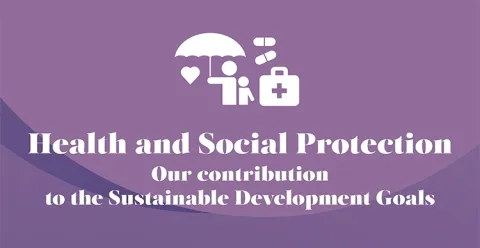 © AFD
© AFD
On the ground
Below, you’ll find projects, news, and publications related to this topic — all in one place.
News & events
Madagascar: young people mobilized to improve living conditions in Antananarivo
Published on January 23, 2026
Related topics
Key figures
-
474 million euros committed to the sector in 2023
-
31 million people will have improved access to healthcare thanks to the projects financed in 2023
-
92% of funded projects aim to improve gender equality

